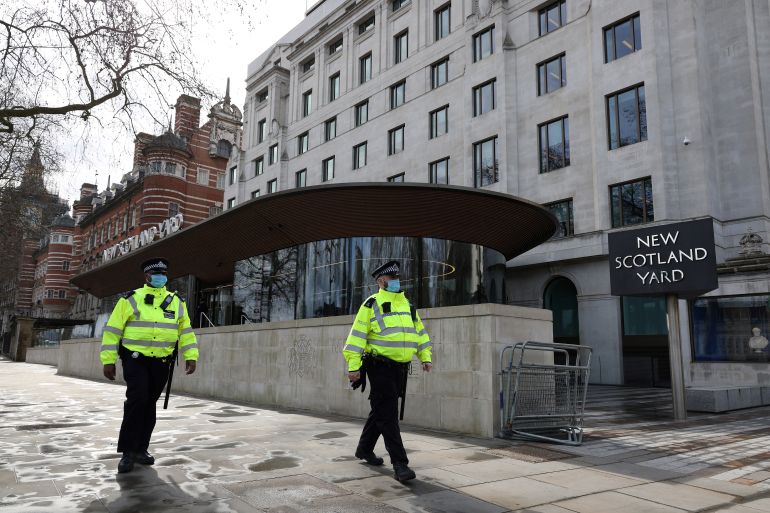UK police are making Muslim mental health a terrorism flag
A mental health project run by counterterrorism forces is criminalising mental health problems among Muslims.

The perception and representation of Muslims as a “suspect community” when it comes to national security and counterterrorism in the United Kingdom is well-established. But a more recent turn within these operations towards mental health is creating new, dangerous practices.
Last month, Medact released a report in which it exposed a mental health project run by UK counterterrorism police called “Vulnerability Support Hubs”. Despite the name, these hubs are not about care. Instead, they enable police to surveil, manage perceived risk, and access confidential health information more easily.
Keep reading
list of 4 items‘Feel less and less like playing’: Vinicius Jr in tears over racist abuse
‘Rendered invisible’: A wave of anti-Arab violence tests US hate crime laws
Germany bans far-right Austrian nationalist Martin Sellner from entry
The hubs were established in 2016 because police noticed that approximately half of the people reported to its counter-extremism programme, Prevent, appeared to have a mental health condition. Racialised groups, especially Muslims, are also referred at a grossly disproportionate rate.
As a pre-crime programme, referrals to Prevent are made on the basis of suspicion and speculation alone. Yet police refuse to see these statistics for what they almost certainly reflect: widespread Islamophobia which associates Muslims with terrorism, combined with a longstanding stigma that portrays people with mental health problems as dangerous.
Instead, police interpreted these statistics as supporting evidence of a presumed – but never robustly evidenced – link between poor mental health and terrorism. Not just anyone with poor mental health is suspect, however. Muslims with mental health problems, in particular, fall under the scrutiny of this programme.
This means that these so-called “Vulnerability Support Hubs” – which operated in near-total secrecy for five years – may be harming people with genuine mental health conditions, and criminalising, or rendering suspect, poor mental health among Muslims.
This happens because, at the hubs, people who have been referred to Prevent and are suspected of having a mental health condition are assessed by NHS mental health professionals embedded within counterterrorism units. These assessments often appear to happen alongside police or Prevent officers: security personnel whose presence alone may impact clinical diagnosis and the therapeutic encounter.
On top of this, the hubs provide a vehicle through which counterterrorism police can influence mental healthcare providers who are already treating patients. Risk assessments are a standard part of psychiatrists’ duties, but Prevent’s pre-crime approach brings vague and racialised factors into play.
For example, one case study in the report details how police sought to “secure admission and prevent discharge” of a man experiencing psychosis who had previously been receiving home treatment, on the basis of “unacceptable unknowns”. In two other cases, police listed conversion to Islam as a relevant concern.
A perhaps even more disturbing possibility is that these “Vulnerability Support Hubs” may be pathologising Muslim political agency and dissent.
Many of the people assessed by the hubs do not have diagnosable mental illnesses and are therefore deemed “unsuitable for mainstream services”. But the hubs operate with such broad definitions of “mental health”, “complex needs” and “behavioural and emotional difficulties” that – in contrast to mainstream mental health services – their thresholds are extremely low.
This becomes worrying when considering the potential for medicine to be misused as a tool for social control. In the Soviet Union, political dissidents were labelled as suffering from “sluggish schizophrenia” and often incarcerated for long periods. Such systematic abuse of psychiatry was the reason codes of ethics were developed for the profession.
Documents obtained via Freedom of Information requests on which we based our report suggest that mental health practitioners may be engaging in what is effectively “deradicalisation” – a practice well beyond their healthcare remit. Especially given the dubious scientific validity and efficacy of such concepts and practices, the Royal College of Psychiatrists’ warning that so-called radicalisation is “not a mental illness” should be heeded.
The hubs raise a host of other serious ethical concerns that epitomise wider problems with the Prevent policy in healthcare and beyond.
They pose questions about potential coercion and the apparent use of medicine as a security device to enforce cooperation with the police deradicalisation scheme Channel.
They highlight the neoliberal state’s withdrawal from adequately funding mental healthcare at the very same time that invasive surveillance is stepped up.
They underline just how deeply racism is institutionalised, why we should not be surprised that racialised minorities distrust healthcare services, and why racialised health inequalities will only deepen with time – unless policies like Prevent and the hostile environment are dismantled.
Despite the lack of an independent evaluation, “Vulnerability Support Hubs” are currently being rolled out nationwide under what police call “Project Cicero”. Having previously only operated in England and Wales, they were recently introduced in Scotland too. Since the UK is a leading exporter of innovations in the field of counterextremism, the hubs may well augur a troubling direction for counterterrorism policing and pre-crime policing across the world.
The views expressed in this article are the author’s own and do not necessarily reflect Al Jazeera’s editorial stance.
